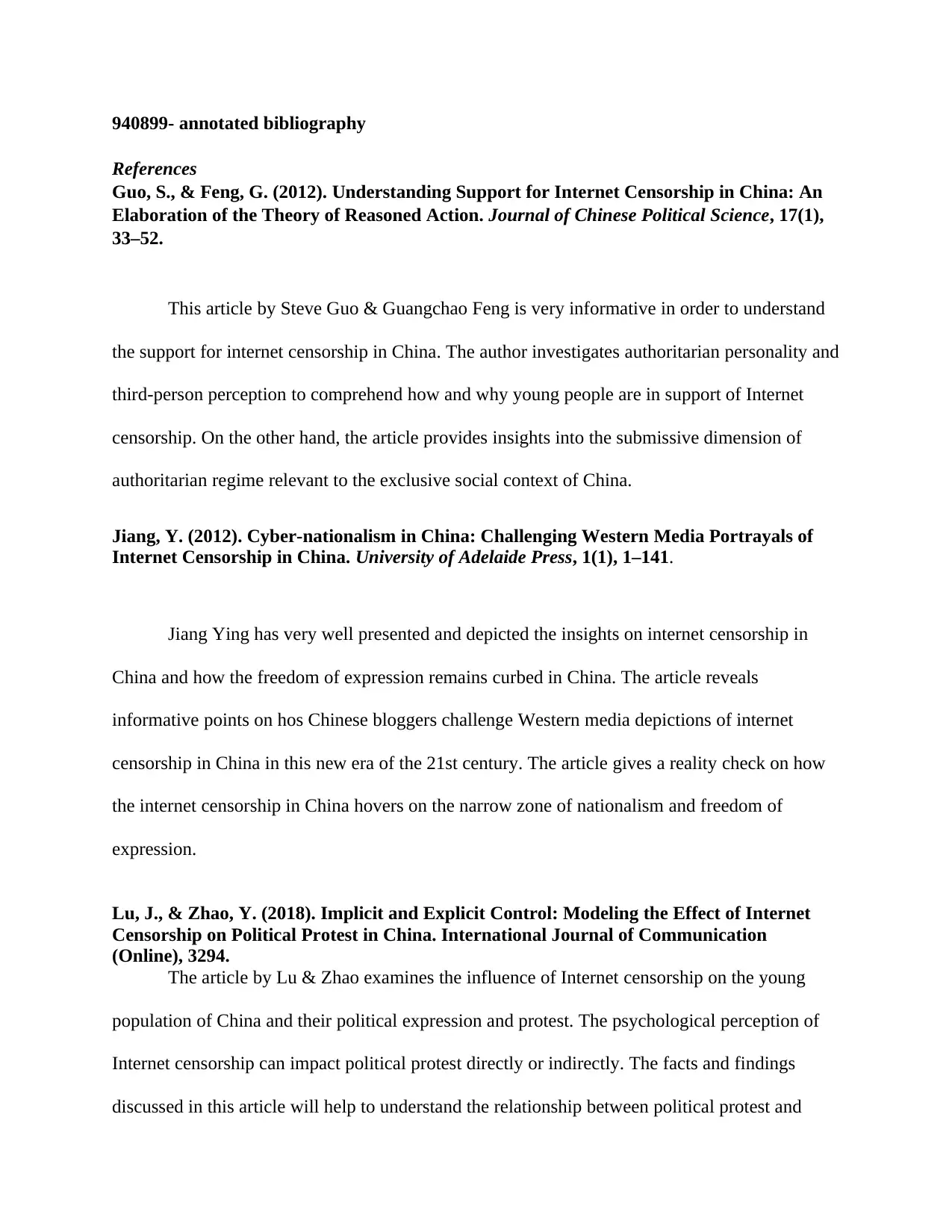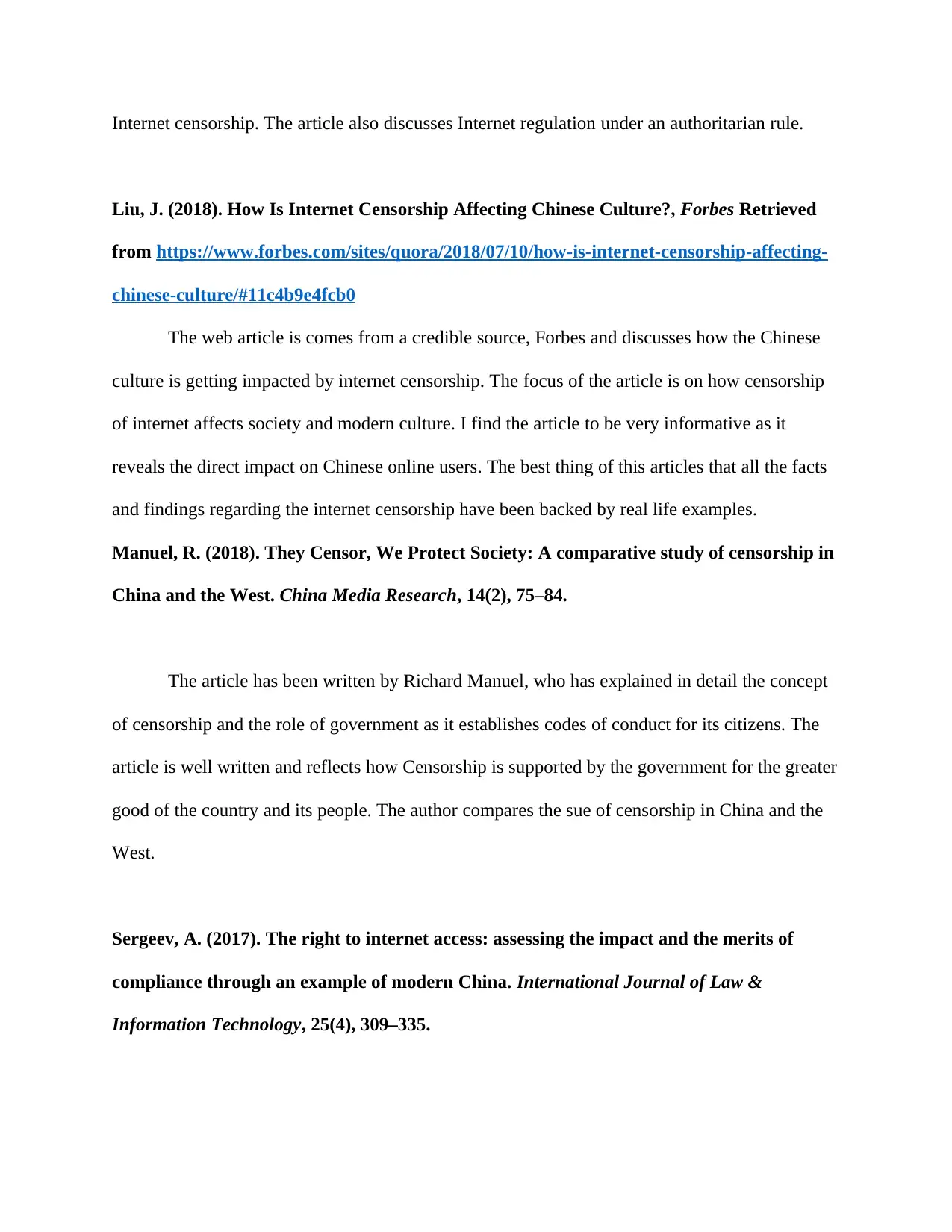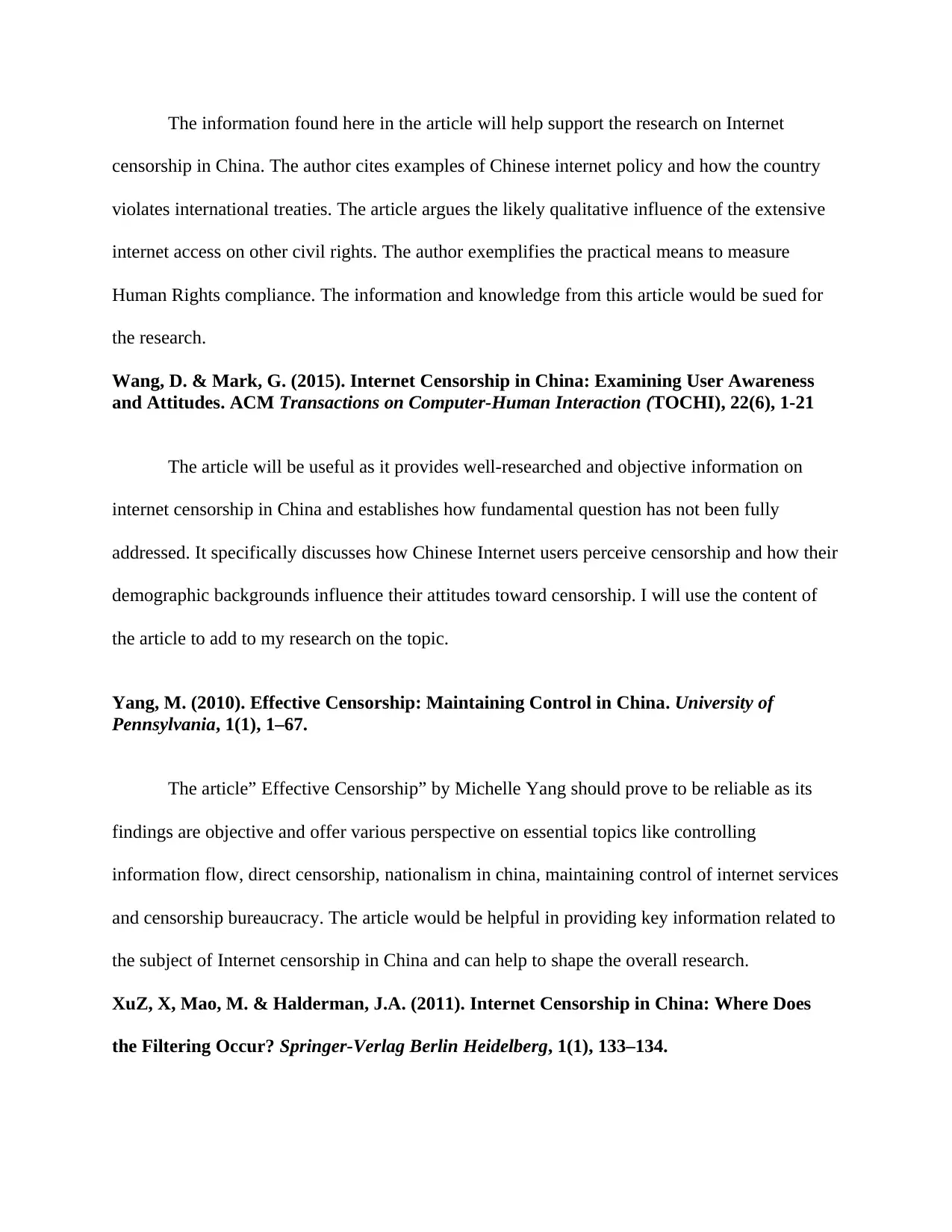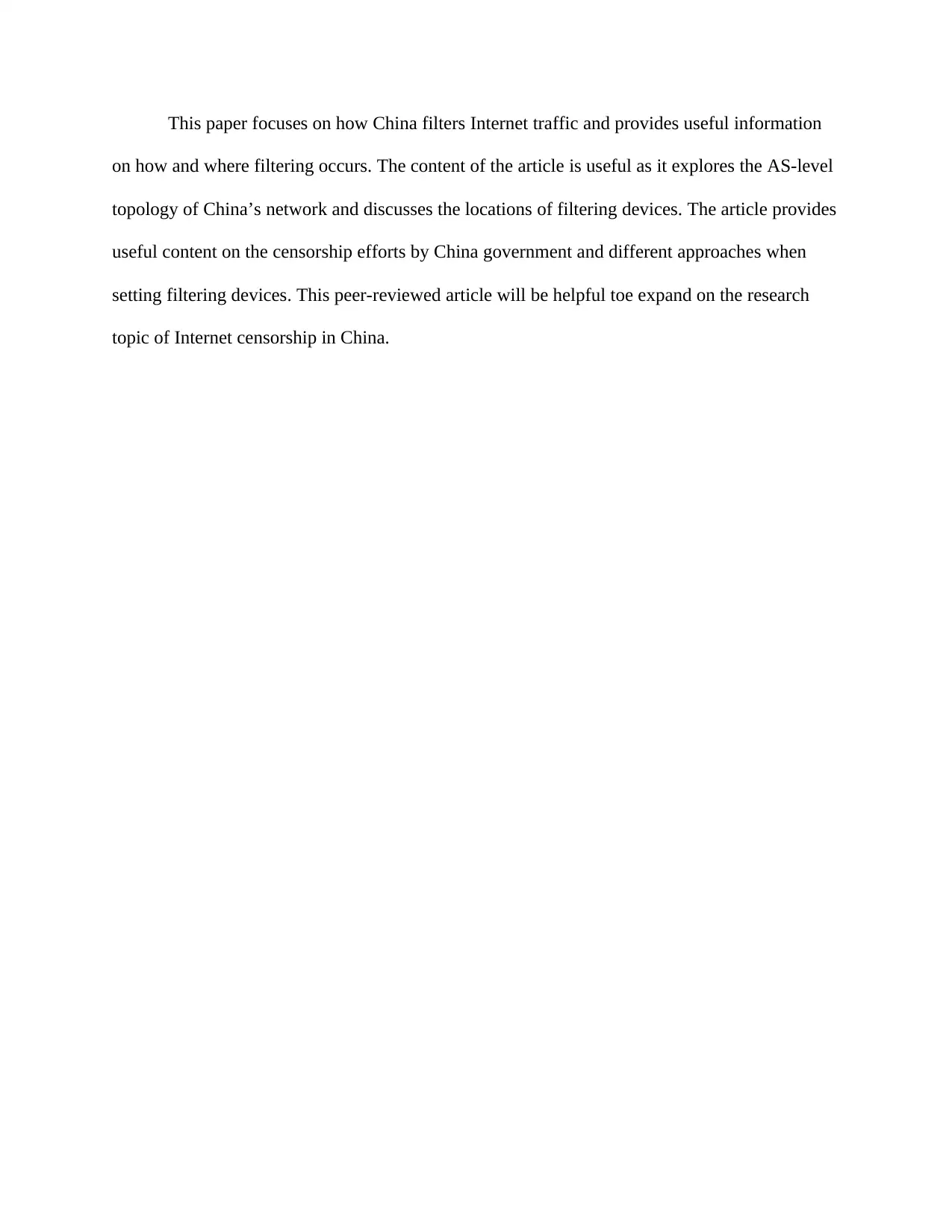ENGL1100: Annotated Bibliography on Internet Censorship in China
VerifiedAdded on 2023/04/20
|4
|1000
|137
Annotated Bibliography
AI Summary
This annotated bibliography compiles and summarizes several academic articles and web resources focusing on internet censorship in China. It covers various aspects, including the reasons behind support for censorship among young Chinese citizens, the challenge to Western media portrayals by Chinese bloggers, the impact of censorship on political expression and culture, comparisons with censorship in the West, and the violation of international treaties regarding internet access. The bibliography also examines user awareness and attitudes towards censorship, the mechanisms of filtering, and the overall control maintained by the Chinese government over internet services. This resource provides a comprehensive overview for research on the multifaceted issue of internet censorship in China.

940899- annotated bibliography
References
Guo, S., & Feng, G. (2012). Understanding Support for Internet Censorship in China: An
Elaboration of the Theory of Reasoned Action. Journal of Chinese Political Science, 17(1),
33–52.
This article by Steve Guo & Guangchao Feng is very informative in order to understand
the support for internet censorship in China. The author investigates authoritarian personality and
third-person perception to comprehend how and why young people are in support of Internet
censorship. On the other hand, the article provides insights into the submissive dimension of
authoritarian regime relevant to the exclusive social context of China.
Jiang, Y. (2012). Cyber-nationalism in China: Challenging Western Media Portrayals of
Internet Censorship in China. University of Adelaide Press, 1(1), 1–141.
Jiang Ying has very well presented and depicted the insights on internet censorship in
China and how the freedom of expression remains curbed in China. The article reveals
informative points on hos Chinese bloggers challenge Western media depictions of internet
censorship in China in this new era of the 21st century. The article gives a reality check on how
the internet censorship in China hovers on the narrow zone of nationalism and freedom of
expression.
Lu, J., & Zhao, Y. (2018). Implicit and Explicit Control: Modeling the Effect of Internet
Censorship on Political Protest in China. International Journal of Communication
(Online), 3294.
The article by Lu & Zhao examines the influence of Internet censorship on the young
population of China and their political expression and protest. The psychological perception of
Internet censorship can impact political protest directly or indirectly. The facts and findings
discussed in this article will help to understand the relationship between political protest and
References
Guo, S., & Feng, G. (2012). Understanding Support for Internet Censorship in China: An
Elaboration of the Theory of Reasoned Action. Journal of Chinese Political Science, 17(1),
33–52.
This article by Steve Guo & Guangchao Feng is very informative in order to understand
the support for internet censorship in China. The author investigates authoritarian personality and
third-person perception to comprehend how and why young people are in support of Internet
censorship. On the other hand, the article provides insights into the submissive dimension of
authoritarian regime relevant to the exclusive social context of China.
Jiang, Y. (2012). Cyber-nationalism in China: Challenging Western Media Portrayals of
Internet Censorship in China. University of Adelaide Press, 1(1), 1–141.
Jiang Ying has very well presented and depicted the insights on internet censorship in
China and how the freedom of expression remains curbed in China. The article reveals
informative points on hos Chinese bloggers challenge Western media depictions of internet
censorship in China in this new era of the 21st century. The article gives a reality check on how
the internet censorship in China hovers on the narrow zone of nationalism and freedom of
expression.
Lu, J., & Zhao, Y. (2018). Implicit and Explicit Control: Modeling the Effect of Internet
Censorship on Political Protest in China. International Journal of Communication
(Online), 3294.
The article by Lu & Zhao examines the influence of Internet censorship on the young
population of China and their political expression and protest. The psychological perception of
Internet censorship can impact political protest directly or indirectly. The facts and findings
discussed in this article will help to understand the relationship between political protest and
Paraphrase This Document
Need a fresh take? Get an instant paraphrase of this document with our AI Paraphraser

Internet censorship. The article also discusses Internet regulation under an authoritarian rule.
Liu, J. (2018). How Is Internet Censorship Affecting Chinese Culture?, Forbes Retrieved
from https://www.forbes.com/sites/quora/2018/07/10/how-is-internet-censorship-affecting-
chinese-culture/#11c4b9e4fcb0
The web article is comes from a credible source, Forbes and discusses how the Chinese
culture is getting impacted by internet censorship. The focus of the article is on how censorship
of internet affects society and modern culture. I find the article to be very informative as it
reveals the direct impact on Chinese online users. The best thing of this articles that all the facts
and findings regarding the internet censorship have been backed by real life examples.
Manuel, R. (2018). They Censor, We Protect Society: A comparative study of censorship in
China and the West. China Media Research, 14(2), 75–84.
The article has been written by Richard Manuel, who has explained in detail the concept
of censorship and the role of government as it establishes codes of conduct for its citizens. The
article is well written and reflects how Censorship is supported by the government for the greater
good of the country and its people. The author compares the sue of censorship in China and the
West.
Sergeev, A. (2017). The right to internet access: assessing the impact and the merits of
compliance through an example of modern China. International Journal of Law &
Information Technology, 25(4), 309–335.
Liu, J. (2018). How Is Internet Censorship Affecting Chinese Culture?, Forbes Retrieved
from https://www.forbes.com/sites/quora/2018/07/10/how-is-internet-censorship-affecting-
chinese-culture/#11c4b9e4fcb0
The web article is comes from a credible source, Forbes and discusses how the Chinese
culture is getting impacted by internet censorship. The focus of the article is on how censorship
of internet affects society and modern culture. I find the article to be very informative as it
reveals the direct impact on Chinese online users. The best thing of this articles that all the facts
and findings regarding the internet censorship have been backed by real life examples.
Manuel, R. (2018). They Censor, We Protect Society: A comparative study of censorship in
China and the West. China Media Research, 14(2), 75–84.
The article has been written by Richard Manuel, who has explained in detail the concept
of censorship and the role of government as it establishes codes of conduct for its citizens. The
article is well written and reflects how Censorship is supported by the government for the greater
good of the country and its people. The author compares the sue of censorship in China and the
West.
Sergeev, A. (2017). The right to internet access: assessing the impact and the merits of
compliance through an example of modern China. International Journal of Law &
Information Technology, 25(4), 309–335.

The information found here in the article will help support the research on Internet
censorship in China. The author cites examples of Chinese internet policy and how the country
violates international treaties. The article argues the likely qualitative influence of the extensive
internet access on other civil rights. The author exemplifies the practical means to measure
Human Rights compliance. The information and knowledge from this article would be sued for
the research.
Wang, D. & Mark, G. (2015). Internet Censorship in China: Examining User Awareness
and Attitudes. ACM Transactions on Computer-Human Interaction (TOCHI), 22(6), 1-21
The article will be useful as it provides well-researched and objective information on
internet censorship in China and establishes how fundamental question has not been fully
addressed. It specifically discusses how Chinese Internet users perceive censorship and how their
demographic backgrounds influence their attitudes toward censorship. I will use the content of
the article to add to my research on the topic.
Yang, M. (2010). Effective Censorship: Maintaining Control in China. University of
Pennsylvania, 1(1), 1–67.
The article” Effective Censorship” by Michelle Yang should prove to be reliable as its
findings are objective and offer various perspective on essential topics like controlling
information flow, direct censorship, nationalism in china, maintaining control of internet services
and censorship bureaucracy. The article would be helpful in providing key information related to
the subject of Internet censorship in China and can help to shape the overall research.
XuZ, X, Mao, M. & Halderman, J.A. (2011). Internet Censorship in China: Where Does
the Filtering Occur? Springer-Verlag Berlin Heidelberg, 1(1), 133–134.
censorship in China. The author cites examples of Chinese internet policy and how the country
violates international treaties. The article argues the likely qualitative influence of the extensive
internet access on other civil rights. The author exemplifies the practical means to measure
Human Rights compliance. The information and knowledge from this article would be sued for
the research.
Wang, D. & Mark, G. (2015). Internet Censorship in China: Examining User Awareness
and Attitudes. ACM Transactions on Computer-Human Interaction (TOCHI), 22(6), 1-21
The article will be useful as it provides well-researched and objective information on
internet censorship in China and establishes how fundamental question has not been fully
addressed. It specifically discusses how Chinese Internet users perceive censorship and how their
demographic backgrounds influence their attitudes toward censorship. I will use the content of
the article to add to my research on the topic.
Yang, M. (2010). Effective Censorship: Maintaining Control in China. University of
Pennsylvania, 1(1), 1–67.
The article” Effective Censorship” by Michelle Yang should prove to be reliable as its
findings are objective and offer various perspective on essential topics like controlling
information flow, direct censorship, nationalism in china, maintaining control of internet services
and censorship bureaucracy. The article would be helpful in providing key information related to
the subject of Internet censorship in China and can help to shape the overall research.
XuZ, X, Mao, M. & Halderman, J.A. (2011). Internet Censorship in China: Where Does
the Filtering Occur? Springer-Verlag Berlin Heidelberg, 1(1), 133–134.
⊘ This is a preview!⊘
Do you want full access?
Subscribe today to unlock all pages.

Trusted by 1+ million students worldwide

This paper focuses on how China filters Internet traffic and provides useful information
on how and where filtering occurs. The content of the article is useful as it explores the AS-level
topology of China’s network and discusses the locations of filtering devices. The article provides
useful content on the censorship efforts by China government and different approaches when
setting filtering devices. This peer-reviewed article will be helpful toe expand on the research
topic of Internet censorship in China.
on how and where filtering occurs. The content of the article is useful as it explores the AS-level
topology of China’s network and discusses the locations of filtering devices. The article provides
useful content on the censorship efforts by China government and different approaches when
setting filtering devices. This peer-reviewed article will be helpful toe expand on the research
topic of Internet censorship in China.
1 out of 4
Your All-in-One AI-Powered Toolkit for Academic Success.
+13062052269
info@desklib.com
Available 24*7 on WhatsApp / Email
![[object Object]](/_next/static/media/star-bottom.7253800d.svg)
Unlock your academic potential
Copyright © 2020–2026 A2Z Services. All Rights Reserved. Developed and managed by ZUCOL.
